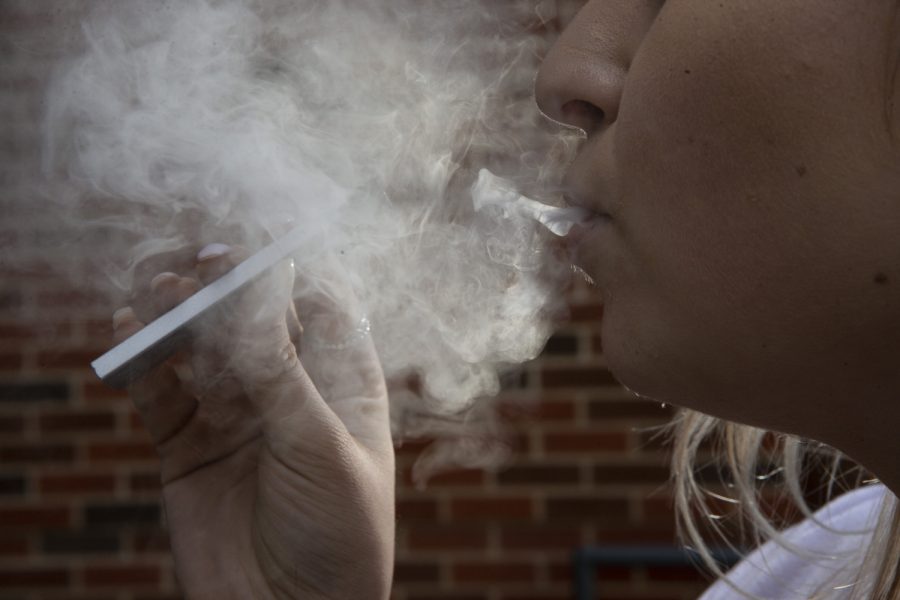UI’s tobacco ban difficult to enforce as students continue to smoke on campus
As more students shift from using combustible cigarettes to e-cigarettes such as vapes, UI Student Health & Wellness cessation program attendance has declined. UI’s enforcement of a tobacco-free policy continues to be difficult to enforce.
Photo Illustration by Katie Goodale
October 18, 2018
As students move from combustible cigarettes to vapes and Juuls, the University of Iowa aims to keep its campus tobacco free.
College campuses in the United States have seen a trend in students shifting from smoking cigarettes to using e-cigarettes. A report published by the Centers for Disease Control & Prevention said most adult e-cigarette users do not quit smoking cigarettes and instead use both products.
As of November 2017, 2,082 U.S. colleges had smoke-free policies, according to a 2018 report published by the CDC. This number has gone up; in 2012, 774 universities had the policies.
RELATED: Iowa City parks no longer permit tobacco usage
The UI adopted a tobacco-free policy on July 1, 2008, when the state instituted a smoking ban on state property, and the university has since offered several cessation programs for members of the community. The UI’s ban includes but is not limited to cigarettes, cigars, pipes, e-cigarettes, and any non-FDA approved nicotine-delivery device.
Steph Beecher, a senior behavioral health consultant, said it is not enough to eliminate tobacco on campus, and it’s necessary to offer appropriate cessation programs. However, enrollment in cessation programs has been on a decline.
According to a study conducted by UI Student Health & Wellness, 42 percent of students used cigarettes in 2004. This number has fallen in the years since to 34 percent in 2012 and 31 percent in 2018.
RELATED: Tobacco citations decreasing, despite reports of smoking
“When we went tobacco-free … we have had free tobacco cessations in place for students, combustible smoking [goes] down … those cessation programs have been dwindling,” Beecher said. “Now, we are seeing e-cigarette use going up. We don’t see that many students coming in.”
In 2016, 17.5 percent students used e-cigarettes, according to the Student Health study. This number increased to 34.4 percent in 2018.
“[E-cigarette use] is not being perceived as an issue in the last year …” Beecher said. “We are in the critical stage right now; bystanders are becoming more aware.”
Despite UI Student Health offering free consultations to students, requests for visits have been shrinking, she said. This year, one student has used the service. Nine students used the service in the 2013-14 academic year and 33 in 2009-10.
Beecher said students right now do not perceive using e-cigarettes as a problem and do not realize they are getting addicted.
“But for vapes, these companies have a product that is so addictive that you might have all the willpower in the world, but you might still be unsuccessful in quitting,” she said. “You’re fighting an uphill battle.”
The UI Public Safety Department enforces a ban on cigarettes and e-cigarettes on university property, Public Safety media-relations manager Hayley Bruce said in an email to The Daily Iowan. Citations are issued to routine offenders
The UI police issued 65 citations in 2015, three in 2016, nine in 2017, and 14 as of now in 2018, Bruce said.
UI sophomore Evelyn LoGiudici said she has been vaping occasionally for the last year and half, but she is aware of the health hazards of vaping and using tobacco.
“I am aware about the UI’s tobacco-free policy,” she said. “I don’t vape on university property. If I ever have, no one has ever told me [not do so on UI property].”
Kelly Stucker, the owner of Konnexion, a store that sells tobacco among many other items, said she has seen a shift from people smoking cigarettes to using e-cigarettes and vapes.
Stucker said a large portion of her clientele are UI students. She does not worry about being located near a tobacco-free campus, she said, and it doesn’t affect her environment.
“Vapes have gotten huge in the past couple of years,” she said. “It’s kind of a culture thing. It is easier, it doesn’t stink, it is quick, and you don’t have the smoker shame associated with it …”






